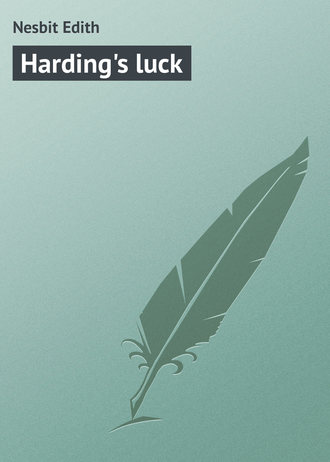
Эдит Несбит
Harding's luck
Mr. Beale, waiting for him by New Cross Station, put his empty pipe in his pocket and strolled down to meet him. Dickie drew him down a side street and held out the silver. "Two days' work," he said. "We ain't no call to take the road 'cept for a pleasure trip. I got a trade, I 'ave. 'Ow much a week's four bob a day? Twenty-four bob I make it."
"Lor!" said Mr. Beale, with his mouth open.
"Now I tell you what, you get 'old of some more old sofy legs and a stone and a strap to sharpen my knife with. And there we are. Twenty-four shillings a week for a chap an' 'is nipper ain't so dusty, farver, is it? I've thought it all up and settled it all out. So long as the weather holds we'll sleep in the bed with the green curtains, and I'll 'ave a green wood for my workshop, and when the nights get cold we'll rent a room of our very own and live like toffs, won't us?"
The child's eyes were shining with excitement.
"'Pon my sam, I believe you like work," said Mr. Beale in tones of intense astonishment.
"I like it better'n cadgin'," said Dickie.
They did as Dickie had said, and for two days Mr. Beale was content to eat and doze and wake and watch Dickie's busy fingers and eat and doze again. But on the third day he announced that he was getting the fidgets in his legs.
"I must do a prowl," he said; "I'll be back afore sundown. Don't you forget to eat your dinner when the sun comes level the top of that high tree. So long, matey."
Mr. Beale slouched off in the sunshine in his filthy old clothes, and Dickie was left to work alone in the green and golden wood. It was very still. Dickie hardly moved at all, and the chips that fell from his work fell more softly than the twigs and acorns that dropped now and then from some high bough. A goldfinch swung on a swaying hazel branch and looked at him with bright eyes, unafraid; a grass snake slid swiftly by – it was out on particular business of its own, so it was not afraid of Dickie nor he of it. A wood-pigeon swept rustling wings across the glade where he sat, and once a squirrel ran right along a bough to look down at him and chatter, thickening its tail as a cat does hers when she is angry.
It was a long and very beautiful day, the first that Dickie had ever spent alone. He worked harder than ever, and when by the lessening light it was impossible to work any longer, he lay back against a tree root to rest his tired back and to gloat over the thought that he had made two boxes in one day – eight shillings – in one single day, eight splendid shillings.
The sun was quite down before Mr. Beale returned. He looked unnaturally fat, and as he sat down on the moss something inside the front of his jacket moved and whined.
"Oh! what is it?" Dickie asked, sitting up, alert in a moment; "not a dawg? Oh! farver, you don't know how I've always wanted a dawg."
"Well, you've a-got yer want now, three times over, you 'ave," said Beale, and, unbuttoning his jacket, took out a double handful of soft, fluffy sprawling arms and legs and heads and tails – three little fat, white puppies.
"Oh, the jolly little beasts!" said Dickie; "ain't they fine? Where did you get them?"
"They was give me," said Mr. Beale, re-knotting his handkerchief, "by a lady in the country."
He fixed his eyes on the soft blue of the darkening sky.
"Try another," said Dickie calmly.
"Ah! it ain't no use trying to deceive the nipper – that sharp he is," said Beale, with a mixture of pride and confusion. "Well, then, not to deceive you, mate, I bought 'em."
"What with?" said Dickie, lightning quick.
"With – with money, mate – with money, of course."
"How'd you get it?"
No answer.
"You didn't pinch it?"
"No – on my sacred sam, I didn't," said Beale eagerly; "pinching leads to trouble. I've 'ad my lesson."
"You cadged it, then?" said Dickie.
"Well," said Beale sheepishly, "what if I did?"
"You've spoiled everything," said Dickie, furious, and he flung the two newly finished boxes violently to the ground, and sat frowning with eyes downcast.
Beale, on all fours, retrieved the boxes.
"Two," he said, in awestruck tones; "there never was such a nipper!"
"It doesn't matter," said Dickie in a heartbroken voice, "you've spoiled everything, and you lie to me, too. It's all spoiled. I wish I'd never come back outer the dream, so I do."
"Now lookee here," said Beale sternly, "don't you come this over us, 'cause I won't stand it, d'y 'ear? Am I the master or is it you? D'ye think I'm going to put up with being bullied and druv by a little nipper like as I could lay out with one 'and as easy as what I could one of them pups?" He moved his foot among the soft, strong little things that were uttering baby-growls and biting at his broken boot with their little white teeth.
"Do," said Dickie bitterly, "lay me out if you want to. I don't care."
"Now, now, matey" – Beale's tone changed suddenly to affectionate remonstrance – "I was only kiddin'. Don't take it like that. You know I wouldn't 'urt a 'air of yer 'ed, so I wouldn't."
"I wanted us to live honest by our work – we was doing it. And you've lowered us to the cadgin' again. That's what I can't stick," said Dickie.
"It wasn't. I didn't have to do a single bit of patter for it anyhow. It was a wedding, and I stopped to 'ave a squint, and there'd been a water-cart as 'ad stopped to 'ave a squint too, and made a puddle as big as a tea-tray, and all the path wet. An' the lady in her white, she looks at the path and the gent 'e looks at 'er white boots – an' I off's with me coat like that there Rally gent you yarned me about, and flops it down in the middle of the puddle, right in front of the gal. And she tips me a smile like a hangel and 'olds out 'er hand – in 'er white glove and all – and yer know what my 'ands is like, matey."
"Yes," said Dickie, "go on."
"And she just touched me 'and and walks across me coat. And the people laughed and clapped – silly apes! And the gent 'e tipped me a thick 'un, and I spotted the pups a month ago, and I knew I could have 'em for five bob, so I got 'em. And I'll sell em for thribble the money, you see if I don't. An' I thought you'd be as pleased as pleased – me actin' so silly, like as if I was one of them yarns o' yourn an' all. And then first minute I gets 'ere, you sets on to me. But that's always the way."
"Please, please forgive me, father," said Dickie, very much ashamed of himself; "I am so sorry. And it was nice of you and I am pleased – and I do love the pups – and we won't sell all three, will us? I would so like to have one. I'd call it 'True.' One of the dogs in my dream was called that. You do forgive me, don't you, father?"
"Oh! that's all right," said Beale.
Next day again a little boy worked alone in a wood, and yet not alone, for a small pup sprawled and yapped and scrapped and grunted round him as he worked. No squirrels or birds came that day to lighten Dickie's solitude, but True was more to him than many birds or squirrels. A woman they had overtaken on the road had given him a bit of blue ribbon for the puppy's neck, in return for the lift which Mr. Beale had given her basket on the perambulator. She was selling ribbons and cottons and needles from door to door, and made a poor thing of it, she told them. "An' my grandfather 'e farmed 'is own land in Sussex," she told them, looking with bleared eyes across the fields.
Dickie only made a box and a part of a box that day. And while he sat making it, far away in London a respectable-looking man was walking up and down Regent Street among the shoppers and the motors and carriages, with a fluffy little white dog under each arm. And he sold both the dogs.
"One was a lady in a carriage," he told Dickie later on. "Arst 'er two thick 'uns, I did. Never turned a hair, no more I didn't. She didn't care what its price was, bless you. Said it was a dinky darling and she wanted it. Gent said he'd get her plenty better. No – she wanted that. An' she got it too. A fool and his money's soon parted's what I say. And t'other one I let 'im go cheap, for fourteen bob, to a black clergyman – black as your hat he was, from foreign parts. So now we're bloomin' toffs, an' I'll get a pair of reach-me-downs this very bloomin' night. And what price that there room you was talkin' about?"
It was the beginning of a new life. Dickie wrote out their accounts on a large flagstone near the horse trough by the "Chequers," with a bit of billiard chalk that a man gave him.
It was like this: —

and he made out before he rubbed the chalk off the stone that the difference between twenty-nine shillings and seventy was about two pounds – and that was more than Dickie had ever had, or Beale either, for many a long year.
Then Beale came, wiping his mouth, and they walked idly up the road. Lodgings. Or rather a lodging. A room. But when you have had what is called the key of the street for years enough, you hardly know where to look for the key of a room.
"Where'd you like to be?" Beale asked anxiously. "You like country best, don't yer?"
"Yes," said Dickie.
"But in the winter-time?" Beale urged.
"Well, town then," said Dickie, who was trying to invent a box of a new and different shape to be carved next day.
"I could keep a lookout for likely pups," said Beale; "there's a plenty here and there all about – and you with your boxes. We might go to three bob a week for the room."
"I'd like a 'ouse with a garden," said Dickie.
"Go back to yer Talbots," said Beale.
"No – but look 'ere," said Dickie, "if we was to take a 'ouse – just a little 'ouse, and let half of it."
"We ain't got no sticks to put in it."
"Ain't there some way you get furniture without payin' for it?"
"'Ire systim. But that's for toffs on three quid a week, reg'lar wages. They wouldn't look at us."
"We'll get three quid right enough afore we done," said Dickie firmly; "and if you want London, I'd like our old house because of the seeds I sowed in the garden; I lay they'll keep on a-coming up, forever and ever. That's what annuals means. The chap next door told me. It means flowers as comes up fresh every year. Let's tramp up, and I'll show it to you – where we used to live."
And when they had tramped up and Dickie had shown Mr. Beale the sad-faced little house, Mr. Beale owned that it would do 'em a fair treat.
"But we must 'ave some bits of sticks or else nobody won't let us have no 'ouses."
They flattened their noses against the front window. The newspapers and dirty sackings still lay scattered on the floor as they had fallen from Dickie when he had got up in the morning after the night when he had had The Dream.
The sight pulled at Dickie's heart-strings. He felt as a man might feel who beheld once more the seaport from which in old and beautiful days he had set sail for the shores of romance, the golden splendor of The Fortunate Islands.
"I could doss 'ere again," he said wistfully; "it 'ud save fourpence. Both 'ouses both sides is empty. Nobody wouldn't know."
"We don't need to look to our fourpences so sharp's all that," said Beale.
"I'd like to."
"Wonder you ain't afeared."
"I'm used to it," said Dickie; "it was our own 'ouse, you see."
"You come along to yer supper," said Beale; "don't be so flash with yer own 'ouses."
They had supper at a coffee-shop in the Broadway.
"Two mugs, four billiard balls, and 'arf a dozen door-steps," was Mr. Beale's order. You or I, more polite if less picturesque, would perhaps have said, "Two cups of tea, four eggs, and some thick bread and butter." It was a pleasant meal. Only just at the end it turned into something quite different. The shop was one of those old-fashioned ones, divided by partitions like the stalls in a stable, and over the top of this partition there suddenly appeared a head.
Dickie's mug paused in air half-way to his mouth, which remained open.
"What's up?" Beale asked, trying to turn on the narrow seat and look up, which he couldn't do.
"It's 'im," whispered Dickie, setting down the mug. "That red'eaded chap wot I never see."
And then the redheaded man came round the partition and sat down beside Beale and talked to him, and Dickie wished he wouldn't. He heard little of the conversation; only "better luck next time" from the redheaded man, and "I don't know as I'm taking any" from Beale, and at the parting the redheaded man saying, "I'll doss same shop as wot you do," and Beale giving the name of the lodging-house where, on the way to the coffee-shop, Beale had left the perambulator and engaged their beds.
"Tell you all about it in the morning" were the last words of the redheaded one as he slouched out, and Dickie and Beale were left to finish the door-steps and drink the cold tea that had slopped into their saucers.
When they went out Dickie said —
"What did he want, farver – that redheaded chap?"
Beale did not at once answer.
"I wouldn't if I was you," said Dickie, looking straight in front of him as they walked.
"Wouldn't what?"
"Whatever he wants to."
"Why, I ain't told you yet what he does want."
"'E ain't up to no good – I know that."
"'E's full of notions, that's wot 'e is," said Beale. "If some of 'is notions come out right 'e'll be a-ridin' in 'is own cart and 'orse afore we know where we are – and us a-tramping in 'is dust."
"Ridin' in Black Maria, more like," said Dickie.
"Well, I ain't askin' you to do anything, am I?" said Beale.
"No! – you ain't. But whatever you're in, I'm a-goin' to be in, that's all."
"Don't you take on," said Beale comfortably; "I ain't said I'll be in anything yet, 'ave I? Let's 'ear what 'e says in the morning. If 'is lay ain't a safe lay old Beale won't be in it – you may lay to that."
"Don't let's," said Dickie earnestly. "Look 'ere, father, let us go, both two of us, and sleep in that there old 'ouse of ours. I don't want that red'eaded chap. He'll spoil everything – I know 'e will, just as we're a-gettin' along so straight and gay. Don't let's go to that there doss; let's lay in the old 'ouse."
"Ain't I never to 'ave never a word with nobody without it's you?" said Beale, but not angrily.
"Not with 'im; 'e ain't no class," said Dickie firmly; "and oh! farver, I do so wanter sleep in that 'ouse, that was where I 'ad The Dream, you know."
"Oh, well – come on, then," said Beale; "lucky we've got our thick coats on."
It was quite easy for Dickie to get into the house, just as he had done before, and to go along the passage and open the front door for Mr. Beale, who walked in as bold as brass. They made themselves comfortable with the sacking and old papers – but one at least of the two missed the luxury of clean air and soft moss and a bed canopy strewn with stars. Mr. Beale was soon asleep and Dickie lay still, his heart beating to the tune of the hope that now at last, in this place where it had once come, his dream would come again. But it did not come – even sleep, plain, restful, dreamless sleep, would not come to him. At last he could lie still no longer. He slipped from under the paper, whose rustling did not disturb Mr. Beale's slumbers, and moved into the square of light thrown through the window by the street lamp. He felt in his pockets, pulled out Tinkler and the white seal, set them on the floor, and, moved by memories of the great night when his dream had come to him, arranged the moon-seeds round them in the same pattern that they had lain in on that night of nights. And the moment that he had lain the last seed, completing the crossed triangles, the magic began again. All was as it had been before. The tired eyes that must close, the feeling that through his closed eyelids he could yet see something moving in the centre of the star that the two triangles made.
"Where do you want to go to?" said the same soft small voice that had spoken before. But this time Dickie did not reply that he was "not particular." Instead, he said, "Oh, there! I want to go there!" feeling quite sure that whoever owned that voice would know as well as he, or even better, where "there" was, and how to get to it.
And as on that other night everything grew very quiet, and sleep wrapped Dickie round like a soft garment. When he awoke he lay in the big four-post bed with the green and white curtains; about him were the tapestry walls and the heavy furniture of The Dream.
"Oh!" he cried aloud, "I've found it again! – I've found it! – I've found it!"
And then the old nurse with the hooped petticoats and the queer cap and the white ruff was bending over him; her wrinkled face was alight with love and tenderness.
"So thou'rt awake at last," she said. "Did'st thou find thy friend in thy dreams?"
Dickie hugged her.
"I've found the way back," he said; "I don't know which is the dream and which is real – but you know."
"Yes," said the old nurse, "I know. The one is as real as the other."
He sprang out of bed and went leaping round the room, jumping on to chairs and off them, running and dancing.
"What ails the child?" the nurse grumbled; "get thy hose on, for shame, taking a chill as like as not. What ails thee to act so?"
"It's the not being lame," Dickie explained, coming to a standstill by the window that looked out on the good green garden. "You don't know how wonderful it seems, just at first, you know, not to be lame."
CHAPTER VI
BURIED TREASURE
And then, as he stood there in the sunshine, he suddenly knew.
Having succeeded in dreaming once again the dream which he had so longed to dream, Dickie Harding looked out of the window of the dream-house in Deptford into the dream-garden with its cut yew-trees and box avenues and bowling-greens, and perceived without doubt that this was no dream, but real – as real as the other Deptford where he had sown Artistic Bird Seed and gathered moonflowers and reaped the silver seeds of magic, for it was magic. Dickie was sure of it now. He had not lived in the time of the First James, be sure, without hearing magic talked of. And it seemed quite plain to him that if this that had happened to him was not magic, then there never was and never would be any magic to happen to any one. He turned from the window and looked at the tapestry-hung room – the big bed, the pleasant, wrinkled face of the nurse – and he knew that all this was as real as anything that had happened to him in that other life where he was a little lame boy who took the road with a dirty tramp for father, and lay in the bed with green curtains.
"Was thy friend well, in thy dream?" the nurse asked.
"Yes, oh, yes," said Dickie, "and I carved boxes in my dream, and sold them, and I want to learn a lot more things, so that when I go back again – I mean when I dream that dream again – I shall be able to earn more money."
"'Tis shame that one of thy name should have to work for money," said the nurse.
"It isn't my name there," said Dickie; "and old Sebastian told me every one ought to do some duty to his country, or he wasn't worth his meat and ale. And you don't know how good it is having money that you've earned yourself."
"I ought to," she said; "I've earned mine long enough. Now haste and dress – and then breakfast and thy fencing lesson."
When the fencing lesson was over, Dickie hesitated. He wanted, of course, to hurry off to Sebastian and to go on learning how to make a galleon. But also he wanted to learn some trade that he could teach Beale at Deptford, and he knew, quite as surely as any master craftsman could have known it, that nothing which required delicate handling, such as wood-carving or the making of toy boats, could ever be mastered by Beale. But Beale was certainly fond of dogs. Dickie remembered how little True had cuddled up to him and nestled inside his coat when he lay down to sleep under the newspapers and the bits of sacking in Lavender Terrace, Rosemary Lane.
So Dickie went his way to the kennels to talk to the kennelman. He had been there before with Master Roger Fry, his fencing master, but he had never spoken to the kennelman. And when he got to the kennels he knocked on the door of the kennelman's house and called out, "What ho! within there!" just as people do in old plays. And the door was thrown open by a man in a complete suit of leather, and when Dickie looked in that man's face he saw that it was the face of the man who had lived next door in Lavender Terrace, Rosemary Lane – the man who dug up the garden for the parrot seed.
"Why," said Dickie, "it's you!"
"Who would it be but me, little master?" the man asked with a respectful salute, and Dickie perceived that though this man had the face of the Man Next Door, he had not the Man Next Door's memories.
"Do you live here?" he asked cautiously – "always, I mean."
"Where else should I live?" the man asked, "that have served my lord, your father, all my time, boy and man, and know every hair of every dog my lord owns."
Dickie thought that was a good deal to know – and so it was.
He stayed an hour at the kennels and came away knowing very much more about dogs than he did before, though some of the things he learned would surprise a modern veterinary surgeon very much indeed. But the dogs seemed well and happy, though they were doctored with herb tea instead of stuff from the chemist's, and the charms that were said over them to make them swift and strong certainly did not make them any the less strong and swift.
When Dickie had learned as much about dogs as he felt he could bear for that day, he felt free to go down to the dockyard and go on learning how ships were built. Sebastian looked up at the voice and ceased the blows with which his axe was smoothing a great tree trunk that was to be a mast, and smiled in answer to his smile.
"Oh, what a long time since I have seen thee!" Dickie cried.
And Sebastian, gently mocking him, answered, "A great while indeed – two whole long days. And those thou'st spent merrymaking in the King's water pageant. Two days – a great while, a great, great while."
"I want you to teach me everything you know," said Dickie, picking up an awl and feeling its point.
"Have patience with me," laughed Sebastian; "I will teach thee all thou canst learn, but not all in one while. Little by little, slow and sure."
"You must not think," said Dickie, "that it's only play, and that I do not need to learn because I am my father's son."
"Should I think so?" Sebastian asked; "I that have sailed with Captain Drake and Captain Raleigh, and seen how a gentleman venturer needs to turn his hand to every guess craft? If thou's so pleased to learn as Sebastian is to teach, then he'll be as quick to teach as thou to learn. And so to work!"
He fetched out from the shed the ribs of the little galleon that he and Dickie had begun to put together, and the two set to work on it. It was a happy day. And one happiness was to all the other happinesses of that day as the sun is to little stars – and that happiness was the happiness of being once more a little boy who did not need to use a crutch.
And now the beautiful spacious life opened once more for Dickie, and he learned many things and found the days all good and happy and all the nights white and peaceful, in the big house and the beautiful garden on the slopes above Deptford. And the nights had no dreams in them, and in the days Dickie lived gaily and worthily, the life of the son of a great and noble house, and now he had no prickings of conscience about Beale, left alone in the little house in Deptford. Because one day he said to his nurse —
"How long did it take me to dream that dream about making the boxes and earning the money in the ugly place I told you of?"
"Dreams about that place," she answered him, "take none of our time here. And dreams about this place take none of what is time in that other place."
"But my dream endured all night," objected Dickie.
"Not so," said the nurse, smiling between her white cap frills. "It was after the dream that sleep came – a whole good nightful of it."
So Dickie felt that for Beale no time at all had passed, and that when he went back – which he meant to do – he would get back to Deptford at the same instant as he left it. Which is the essence of this particular kind of white magic. And thus it happened that when he did go back to Mr. Beale he went because his heart called him, and not for any other reason at all.
Days and weeks and months went by and it was autumn, and the apples were ripe on the trees, and the grapes ripe on the garden walls and trellises. And then came a day when all the servants seemed suddenly to go mad – a great rushing madness of mops and brooms and dusters and pails and everything in the house already perfectly clean was cleaned anew, and everything that was already polished was polished freshly, and when Dickie had been turned out of three rooms one after the other, had tumbled over a pail and had a dish-cloth pinned to his doublet by an angry cook, he sought out the nurse, very busy in the linen-room, and asked her what all the fuss was about.
"It can't be a spring-cleaning," he said, "because it's the wrong time of year."
"Never say I did not tell thee," she answered, unfolding a great embroidered cupboard cloth and holding it up critically. "To-morrow thy father and mother come home, and thy baby-brother, and to-day sennight thy little cousins come to visit thee."
"How perfectly glorious!" said Dickie. "But you didn't tell me."
"If I didn't 'twas because you never asked."
"I – I didn't dare to," he said dreamily; "I was so afraid. You see, I've never seen them."
"Afraid?" she said, laying away the folded cloth and taking out another from the deep press, oaken, with smooth-worn, brown iron hinges and lock; "never seen thy father and mother, forsooth!"
"Perhaps it was the fever," said Dickie, feeling rather deceitful. "You said it made me forget things. I don't remember them. Not at all, I don't."
"Do not say that to them," the nurse said, looking at him very gravely.
"I won't. Unless they ask me," he added. "Oh, nurse, let me do something too. What can I do to help?"
"Thou canst gather such flowers as are left in the garden to make a nosegay for thy mother's room; and set them in order in fair water. And bid thy tutor teach thee a welcome song to say to them when they come in."
Gathering the flowers and arranging them was pleasant and easy. Asking so intimate a favor from the sour-faced tutor whom he so much disliked was neither easy nor pleasant. But Dickie did it. And the tutor was delighted to set him to learn a particularly hard and uninteresting piece of poetry, beginning —
"Happy is he
Who, to sweet home retired,
Shuns glory so admired
And to himself lives free;
While he who strives with pride to climb the skies
Falls down with foul disgrace before he dies."
Dickie could not help thinking that the father and mother who were to be his in this beautiful world might have preferred something simpler and more affectionate from their little boy than this difficult piece whose last verse was the only one which seemed to Dickie to mean anything in particular. In this verse Dickie was made to remark that he hoped people would say of him, "He died a good old man," which he did not hope, and indeed had never so much as thought of. The poetry, he decided, would have been nicer if it had been more about his father and mother and less about fame and trees and burdens. He felt this so much that he tried to write a poem himself, and got as far as —
"They say there is no other
Can take the place of mother.
I say there is no one I'd rather
See than my father."
But he could not think of any more to say, and besides, he had a haunting idea that the first two lines – which were quite the best – were not his own make-up. So he abandoned the writing of poetry, deciding that it was not his line, and painfully learned the dismal verses appointed by his tutor.
But he never got them said. When the bustle of arrival had calmed a little, Dickie, his heart beating very fast indeed, found himself led by his tutor into the presence of the finest gentleman and the dearest lady he had ever beheld. The tutor gave him a little push so that he had to go forward two steps and to stand alone on the best carpet, which had been spread in their honor, and hissed in a savage whisper —
"Recite your song of welcome."
"'Happy the man,'" began Dickie, in tones of gloom, and tremblingly pronounced the first lines of that unpleasing poem.
But he had not got to "strive with pride" before the dear lady caught him in her arms, exclaiming, "Bless my dear son! how he has grown!" and the fine gentleman thumped him on the back, and bade him "bear himself like a gentleman's son, and not like a queasy square-toes." And they both laughed, and he cried a little, and the tutor seemed to be blotted out, and there they were, all three as jolly as if they had known each other all their lives. And a stout young nurse brought the baby, and Dickie loved it and felt certain it loved him, though it only said, "Goo ga goo," exactly as your baby-brother does now, and got hold of Dickie's hair and pulled it and would not let go.
There was a glorious dinner, and Dickie waited on this new father of his, changed his plate, and poured wine out of a silver jug into the silver cup that my lord drank from. And after dinner the dear lady-mother must go all over the house to see everything, because she had been so long away, and Dickie walked in the garden among the ripe apples and grapes with his father's hand on his shoulder, the happiest, proudest boy in all Deptford – or in all Kent either.
His father asked what he had learned, and Dickie told, dwelling, perhaps, more on the riding, and the fencing, and the bowls, and the music than on the sour-faced tutor's side of the business.
"But I've learned a lot of Greek and Latin, too," he added in a hurry, "and poetry and things like that."
"I fear," said the father, "thou dost not love thy book."
"I do, sir; yet I love my sports better," said Dickie, and looked up to meet the fond, proud look of eyes as blue as his own.
"Thou'rt a good, modest lad," said his father when they began their third round of the garden, "not once to ask for what I promised thee."







